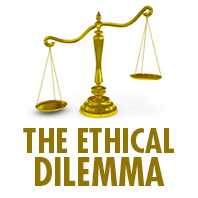The Ethical Dilemma: A New HNN Advice Column

Experiencing an ethical dilemma? Need advice from a humanist perspective? In the spirit of the New York Times “The Ethicist” or Slate’s “Dear Prudence,” Humanist Network News is proud to introduce “The Ethical Dilemma,” an advice column by Joan Reisman-Brill.
Joan Reisman-Brill is a writer based in New York City. She received her BA in English literature from the University of Chicago, an MA also in English lit from the University of Michigan, and an MBA in management and marketing from New York University. She has worked in public relations, marketing and myriad facets of writing and editing for nearly four decades. She has been steadily increasingly her humanist identification and activism at an accelerating rate, and while she doesn’t pretend to have all the answers, she welcomes this opportunity to tackle the questions.
Send your questions to The Ethical Dilemma at hnn@americanhumanist.org.
Atheist Wife, Jewish Husband: My religious husband wants me to accompany him to an intimate meet-and-greet for “our” synagogue’s new rabbi. I don’t want to have anything to do with it, but he really wants me by his side. I dread being put in a position of espousing my atheism to stares and glares, nor do I want to pretend to be on board with things I’m not. But I don’t want to disappoint my spouse. Do I go for the sake of marriage harmony?
—Atheist Wife
Dear Atheist Wife,
You have two main choices: 1. Refuse to go and let your husband go stag, leaving it up to him to explain why his wife is a no-show; or 2. Make him happy by accompanying him. While the first option may make him resentful and wish he’d chosen a wife who’d be there for him, the second option gives you some considerable potential benefits. First of all, your husband will owe you, so maybe you can cash in later by having him go with you to see Bill Maher or something else he might otherwise beg off. You’ll also have the opportunity to hear what’s going on with the new rabbi and perhaps contribute your input, such as suggesting the synagogue undertake community projects with other faith as well as non-faith groups. You will probably also have the option either to hover in the background, listening and learning (which is always a good thing), or—if, once you’ve had some time to mingle, you feel so moved–you could share with the gathering that you are not into religion and explain very briefly and sweetly your reasons why. You never know—there may be other reluctant spouses who feel the same way, or who will start thinking about it because of you. So I suggest that unless you feel it would be too unbearably awkward for you, or that you’d make others (particularly your husband) too uncomfortable, go for it and see what happens. Just remind him it was his idea to drag you along.
My Apathetic Atheist Friend: My friend has had no use for religion for decades, since she was a teenager. When I asked if she was involved in freethought activism like her mother (who is over 90), she told me she had no time for such things and besides, she doesn’t care what other people believe. Religion makes people happy and does lots of good, so what’s it to her if they believe in fairy tales? I feel really disappointed and upset by her attitude, especially since her brother spent his life as a closeted gay man until he died of AIDS. Should I tell her how wrong I think her apathy is?
—An Atheist Who Cares
Dear Caring Atheist,
Sometimes people who grow up free of religion aren’t as focused or assertive about the topic as those who made a difficult or recent break from it, so it just might not be a priority to your friend–and she’s entitled to enjoy that. For all we know, she may be spending time–the time you might want her to write letters or attend secular meetings–doing good deeds in her own way. She wouldn’t appreciate you pushing her to take a stand for secularism, just as you wouldn’t want her to urge you to lighten up.
But you might find an opportunity to mention that much of the discrimination against gay people has its roots in religious doctrine, and that religious groups are not strictly benign. Aside from providing invaluable services to their members and, often, non-members, they are also frequently a catalyst for conflict and discrimination against those who hold different views, and their “fairy tales” can extend to teaching schoolchildren creationism rather than evolution. So feel free to offer these points for her to ponder (when she has time), but respect her perspective. If everyone just practiced “live and let live” as she does, the world would be a better place, and maybe we wouldn’t need secular activists!
